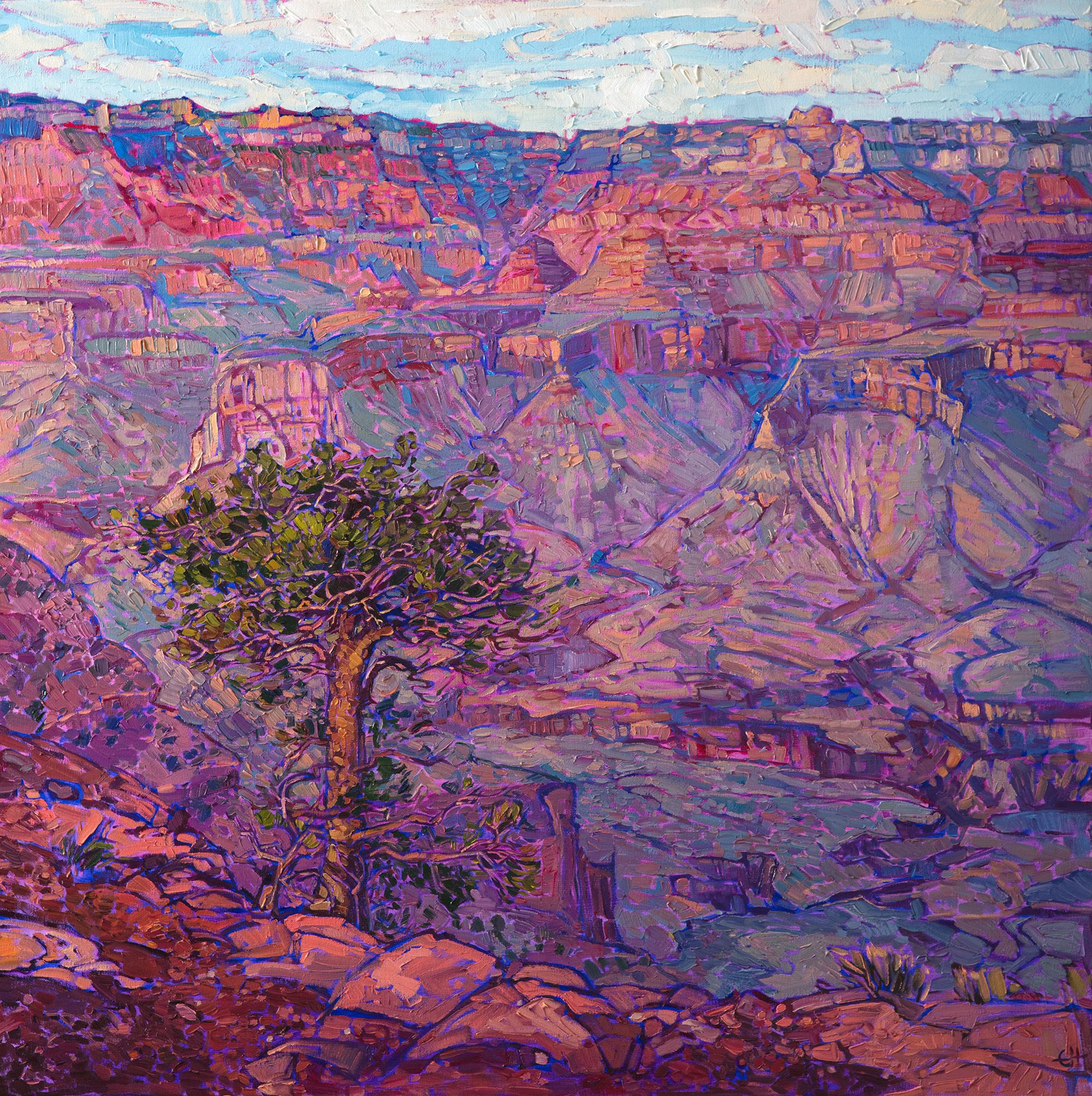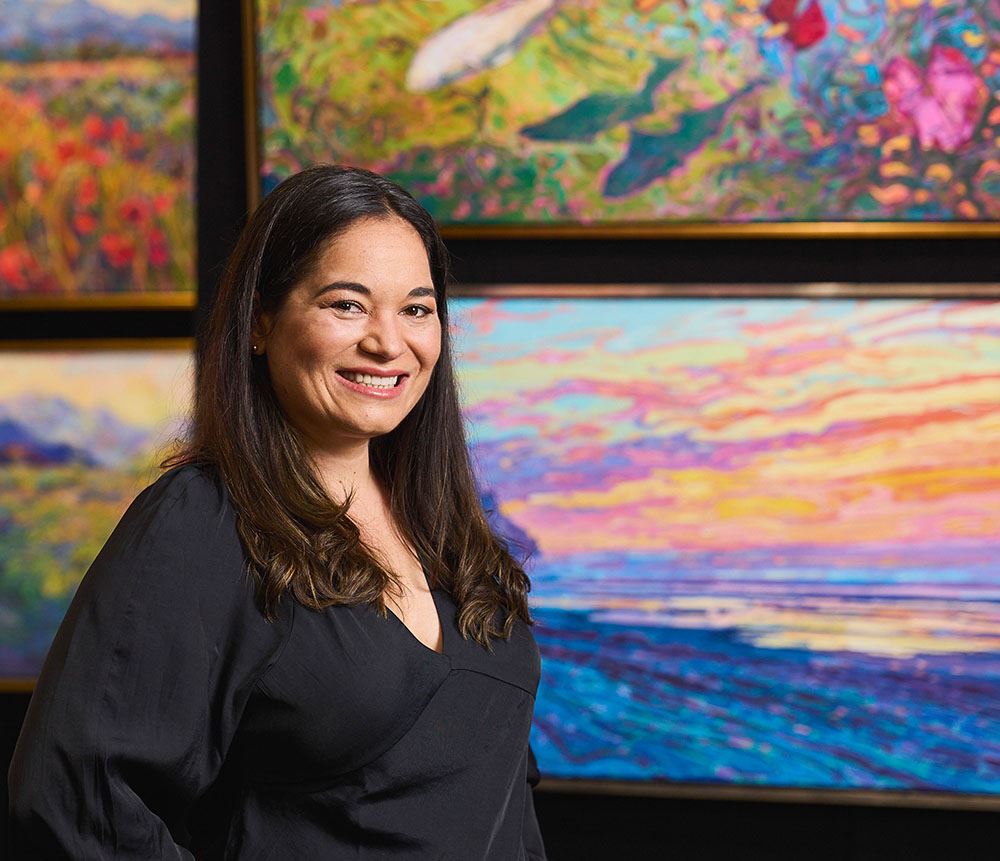Subtotal
$0
U.S. Shipping
FREE
Saved for Later
Shopping Cart
Subtotal
$0
U.S. Shipping
FREE
Saved for Later
The Grand Canyon is an incredible place. This national park is larger than the entire state of Rhode Island. The massive canyon is over a mile deep and ten miles across. As you travel through the canyon, you can experience different ecosystems due to the distances and variations contained in this stunning place. Varied rock layers comprise the canyon, including granite, sandstone, mudstone, and many thousands of fossils.
With its natural beauty and varied ecosystem, it is no wonder that artists have been trying to capture the glory and depth of this enormous place for thousands of years. Ancient figurines depicting local fauna have been found in caves within the canyon. Photographers and painters have also tried to capture the flora, fauna, and rock formations for well over a century.
It is no wonder that Erin Hanson, a prolific painter of the natural world, would also be attracted to this remarkable site.
If you are interested in Erin Hanson's work, this article will allow you to virtually follow in her footsteps around the canyon. You can also use it as a resource when visiting the Grand Canyon National Park. Using this guide, you can see the views Hanson portrays and watch as the park changes throughout the seasons.
As you begin your trip, remember that Erin Hanson is an avid backpacker and hiker. She loves to camp and hike around national parks; in this way, she captures rarely-seen vistas.
If you want to follow in Hanson's footsteps, we suggest you camp at one of the authorized locations found on the NPS site here. As part of this journey, you must decide if you will be camping on the North or South Rim. The North Rim is harder to get to and is more likely to have an early-season snowfall.
Erin Hanson has visited both sides of the park many times and other locations along the way. For this journey, we will start at the seldom-visited North Rim.

Northern Rim by Erin Hanson
Hanson visited the North Rim in November, which means there was already snow on the ground during her journey. Depending on the year, the North Rim campgrounds may be closed at this time, so be sure to book your spot in advance.
Another advantage to visiting the Grand Canyon's northern portion is the incredibly vibrant surrounding landscape. In the fall and winter, the air is clear enough to see for miles around.

Arizona Color by Erin Hanson
From the North Rim, we travel south. As we head for slightly warmer climes, there are many trails and other campgrounds that you can visit, including the South Kaibab Trail and the Bright Angel Trail and Campground. There are also many lookout points along the way, including Lipan Point, Mather Point, Toroweap Overlook, and Yavapai Point.
See how many trails and points you can recognize in the following paintings:

Canyon Edge by Erin Hanson
Above: This is a view from Lipan Point, where you can glimpse the Colorado River down on the canyon floor. This painting captures the colors of the Grand Canyon at dawn.

Grand Canyon Light by Erin Hanson
Above: This oil painting shows a dawn view from the east side of the South Rim. The bright turquoise waters glint with light in this oil painting, reflecting the brightening sky. Dawn color slowly fills the canyon, illuminating it with magenta, apricot, and ochre hues:

Grand Sunset by Erin Hanson
Above: The South Rim's Mather Point spreads across three canvases in this dramatic triptych. The colors are saturated and variegated, bringing to life the emotional impact of seeing the Grand Canyon in person.
As you continue your journey, you may hike into the Grand Canyon. Erin Hanson did just that, beginning her trek about two hours before dawn. The trailhead was positioned far from the canyon, which allowed her to catch a full view of the canyon right at daybreak.

Golden Dawn by Erin Hanson
Here is the story behind the image:
"I started hiking into the Grand Canyon one early morning, 2 hours before dawn. The trailhead began way back from the main canyon, a few miles hike from the first uninterrupted view where you could see the wide expanse of the canyon. As I hiked along with my two brothers, large packs on our backs, I watched the sky slowly lighten above us. Eventually, we no longer needed our headlamps, and I could make out the dim shape of the steep cliff beside us. As the hour of daybreak approached, I started jogging anxiously forward, hoping to catch that magical moment of dawn hitting the Grand Canyon. The trail kept switching back and forth behind a large outcropping in the cliff, and I could not get a full view of the canyon. In the distance, I could see the sun starting to hit the first tips of the distant peaks. I urged my brothers forward, trotting forward at a near gallop now. When the trail finally led me around the final switchback and out into an unimpeded view of the canyon, I skidded to a stop. This is the vision I saw: an ancient manzanita tree catching the sun's bright rays mere minutes after daybreak, with the vast expanse of the canyon as the backdrop. In my painting, you can see the sunlight striking the top of the boulder next to the trail - five minutes later, warm light bathed the entire trail. Five minutes after that, the Grand Canyon itself was fully lit from top to bottom, and the dramatic and mystical golden light of dawn had passed. The colors changed rapidly from brilliant gold and purple to a dull orange and brown. I was so happy I had made it to this spot in the trail in time. I took about a hundred photos during those subsequent minutes, recording the sun slowly descending down the canyon walls." -- Erin Hanson
What a story!
Now, returning to your trek.
As you hike down, you will begin to see changes in the ecosystem, including lush yucca gathering at the edge of a plateau. (below)

Canyon’s Edge by Erin Hanson
When we think of the Grand Canyon, we think of the classic red rock canyon with the Colorado River meandering along. We don’t often view the canyon from the bottom. However, Erin Hanson did just that when she painted this piece near Bright Angel Campground. (below)

Nature’s Pass by Erin Hanson
(Above) This oil painting showcases how diverse and lush the Grand Canyon’s ecosystem is. The Bright Angel trail is filled with cool shadows, green trees, and diverse flora and fauna.
As Hanson returned from the bottom of the canyon, she had to stop to take in the views from two-thirds up the trail. Here is the result:

Canyons Dusk by Erin Hanson
From top to bottom, North to South, the Grand Canyon is a beautiful place teaming with variety, stunning vistas, green trees, cool water, and much more. We highly recommend visiting this iconic Southwestern landscape if you want to walk in Erin Hanson's footsteps.
Would you like to explore more of Erin Hanson’s Grand Canyon landscape paintings?
Explore the Grand Canyon collection here.

About Erin
ERIN HANSON has been painting in oils since she was 8 years old. As a teenager, she apprenticed at a mural studio where she worked on 40-foot-long paintings while selling art commissions on the side. After being told it was too hard to make a living as an artist, she got her degree in Bioengineering from UC Berkeley. Afterward, Erin became a rock climber at Red Rock Canyon, Nevada. Inspired by the colorful scenery she was climbing, she decided to return to her love of painting and create one new painting every week.
She has stuck to that decision, becoming one of the most prolific artists in history, with over 3,000 oil paintings sold to eager collectors. Erin Hanson’s style is known as "Open Impressionism" and is taught in art schools worldwide. With millions of followers, Hanson has become an iconic, driving force in the rebirth of impressionism, inspiring thousands of other artists to pick up the brush.